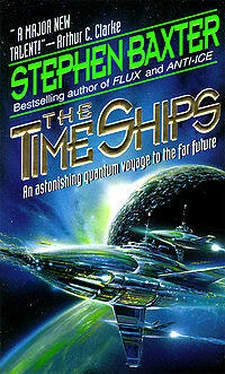Stephen Baxter - The Time Ships
Здесь есть возможность читать онлайн «Stephen Baxter - The Time Ships» — ознакомительный отрывок электронной книги совершенно бесплатно, а после прочтения отрывка купить полную версию. В некоторых случаях можно слушать аудио, скачать через торрент в формате fb2 и присутствует краткое содержание. Год выпуска: 1995, ISBN: 1995, Издательство: HarperCollins, Жанр: Фантастика и фэнтези, на английском языке. Описание произведения, (предисловие) а так же отзывы посетителей доступны на портале библиотеки ЛибКат.
- Название:The Time Ships
- Автор:
- Издательство:HarperCollins
- Жанр:
- Год:1995
- ISBN:0-002-24609-0
- Рейтинг книги:5 / 5. Голосов: 1
-
Избранное:Добавить в избранное
- Отзывы:
-
Ваша оценка:
- 100
- 1
- 2
- 3
- 4
- 5
The Time Ships: краткое содержание, описание и аннотация
Предлагаем к чтению аннотацию, описание, краткое содержание или предисловие (зависит от того, что написал сам автор книги «The Time Ships»). Если вы не нашли необходимую информацию о книге — напишите в комментариях, мы постараемся отыскать её.
by H. G. Wells, it was officially authorized by the Wells estate to mark the centenary of the original’s publication.
Won:
British SF Association Award in 1995
John W. Campbell Memorial Award for Best SF Novel in 1996
Philip K. Dick Award in 1996
Nominated for:
Hugo Award for Best Novel in 1996
Locus Award for Best SF Novel in 1996
Arthur C. Clarke Award in 1996
The Time Ships — читать онлайн ознакомительный отрывок
Ниже представлен текст книги, разбитый по страницам. Система сохранения места последней прочитанной страницы, позволяет с удобством читать онлайн бесплатно книгу «The Time Ships», без необходимости каждый раз заново искать на чём Вы остановились. Поставьте закладку, и сможете в любой момент перейти на страницу, на которой закончили чтение.
Интервал:
Закладка:
With the sepoys leading the way, and with the Morlock supporting himself against my arm, we set off into the interior of the jungle.
Away from the coast, the air was hot and clammy. We moved in single file, with the sepoys at front and back, and Gibson, the Morlock, and myself sandwiched between; I carried the frail Morlock in my arms for much of the journey. The two sepoys kept up their suspicious, hooded glares at us, although after a time they allowed their hands to stray from their webbing holsters. They said not a single word to Nebogipfel or me, in the whole time we traveled together.
Gibson’s expedition had come from 1944 — six years after our own departure, during the German assault on the London Dome.
“And the War is still continuing?”
“I’m afraid so,” he said, sounding grim. “Of course we responded for that brutal attack on London. Paid them back in spades.”
“You were involved in such actions yourself?”
As he walked, he glanced down — apparently involuntarily — at the service ribbons sewn to the chest of his tunic. I did not recognize these at the time — I am no military buff, and in any case some of these awards hadn’t even been devised in my day — but I learned later that they constituted the Distinguished Service Order, and the Distinguished Flying Cross and Bar: high awards indeed, especially for one so young. Gibson said without drama, “I saw a bit of action, yes. A good few sorties. Pretty lucky to be here to talk about it — plenty of good chaps who aren’t.”
“And these sorties were effective?”
“I’ll say. We broke open their Domes for them, without much of a delay after they did us the same favor!”
“And the cities underneath?”
He eyed me. “What do you think? Without its Dome, a city is pretty much defenseless against attack from the air. Oh, you can throw up a barrage from your eighty-eights—”
“ ’Eighty-eights’?”
“The Germans have an eight-point-eight centimeter Flat 36 anti-aircraft gun — pretty useful as a field gun and anti ’Naut, as well as its main purpose: good bit of design… Anyway, if your bomber pilot can get in under such flak he can pretty much dump what he likes into the guts of an un-Domed city.”
“And the results — after six more years of all this?”
He shrugged. “There’s not much in the way of cities left, I suppose. Not in Europe, anyway.”
We reached the vicinity of South Hampstead, I estimated. Here, we broke through a line of trees into a clearing. This was a circular space perhaps a quarter-mile across, but it was not natural: the tree-stumps at its edge showed how the forest had been blasted back, or cut away. Even as we approached, I could see squads of bare-chested infantrymen hacking their way further into the undergrowth with saws and machetes, extending the space. The earth in the clearing was stripped of undergrowth and hardened by several layers of palm fronds, all stamped down into the mud.
At the heart of this clearing sat four of the great Juggernaut machines which I had encountered before, in 1873 and 1938. These beasts sat at four sides of a square a hundred feet across, immobile, their ports gaping like the mouths of thirsty animals; their anti-mine flails hung limp and useless from the drums held out before them, and the mottled green and black coloration of their metal hides was encrusted with guano and fallen leaves. There were a series of other vehicles and items of material scattered around the encampment, including light armored cars, and small artillery pieces mounted on thick-wheeled trolleys.
This, Gibson gave me to understand, would be the site of a sort of graving-yard for time-traveling Juggernauts, in 1944.
Soldiers worked everywhere, but when I walked into the clearing beside Gibson, and with the limping Nebogipfel leaning against me, to a man the troopers ceased their laboring and stared at us with undiluted curiosity.
We reached the courtyard enclosed by the four ’Nauts. At the center of this square there was a white-painted flag-pole; and from this a Union Flag dangled, gaudy, limp and incongruous. A series of tents had been set up in this yard; Gibson invited us to sit on canvas stools beside the grandest of these. A soldier — thin, pale and evidently uncomfortable in the heat — emerged from one of the ’Nauts. I took this fellow to be Gibson’s batman, for the Wing Commander ordered him to bring us some refreshment.
The work of the camp proceeded all around us as we sat there; it was a hive of activity, as military sites always seem endlessly to be. Most of the soldiers wore a full kit of a jungle-green twill shirt and trousers with anklets; on their heads they had soft felt hats with puggrees of light khaki, or else bush hats of (Gibson said) an Australian design. They wore their divisional insignia sewn into their shirts or hats, and most of them carried weaponry: leather bandoliers for small-arms ammunition, web pouches, and the like. They all bore the heavy epaulets I remembered from 1938. In the heat and moisture, most of these troopers were fairly disheveled.
I saw one chap in a suit of pure white which enclosed him head to foot; he wore thick gloves, and a soft helmet which enclosed his head, with an inset visor through which he peered. He worked at the opened side-panels of one of the Juggernauts. The poor fellow must have been melting of the heat in such an enclosure, I surmised; Gibson explained that the suit was of asbestos, to protect him from engine fires.
Not all the soldiers were men — I should think two-fifths of the hundred or so personnel were female — and many of the soldiers bore wounds of one sort or another: burn scars and the like, and even, here and there, prosthetic sections of limb. I realized that the dreadful attrition of the youth of Europe had continued since 1938, necessitating the call-up of those wounded already, and more of the young women.
Gibson took off his heavy boots and massaged his cramped feet with a rueful grin at me. Nebogipfel sipped from a glass of water, while the batman provided Gibson and me with a cup of traditional English breakfast tea — tea, there in the Palaeocene!
“You have made quite a little colony,” I said to Gibson.
“I suppose so. It’s just the drill, you know.” He put down his boots and sipped his tea. “Of course we’re a jumble of Services here — I expect you noticed.”
“No,” I said frankly.
“Well, most of the chaps are Army, of course.” He pointed to a slim young trooper who wore a khaki tag at the shoulders of his Tropical shirt. “But a few of us, like him and myself, are RAF.
“RAF?”
“Royal Air Force. The men in gray suits have finally worked out that we’re the best chaps to drive these great iron brutes, you see.” A trooper of the Army passed by, goggling at Nebogipfel, and Gibson favored him with an easy grin. “Of course we don’t mind giving these foot-sloggers a lift. Better than leaving you to do it yourselves, eh, Stubbins?”
The man Stubbins — slim, red-haired, with an open, friendly face — grinned back, almost shyly, but evidently pleased at Gibson’s attention: all this despite the fact that he must have been a good foot taller than the diminutive Gibson, and some years older. I recognized in Gibson’s relaxed manner something of the poise of the natural leader.
“We’ve been here a week already,” Gibson said to me. “Surprising we didn’t stumble on you earlier, I suppose.”
“We weren’t expecting visitors,” I said drily. “If we had been, I suppose I would have lit fires, or found some other way of signaling our presence.”
He favored me with a wink. “We have been occupied ourselves. We had the devil’s own work to do in the first day or two here. We have good kit, of course — the boffins made it pretty clear to us be fore we left that the climate of dear old England is pretty variable, if you take a long enough view of it — and so we’ve come prepared with an issue of everything from greatcoats to Bombay bloomers. But we weren’t expecting quite these Tropical conditions: not here, in the middle of London! Our clothes seem to be falling apart literally rotting off our backs — and the metal fittings are rusting, and our boots won’t grip in this slime: even my bally socks have shrunk! And the whole lot is being gnawed away by rats.” He frowned. “At least I think they are rats.”
Читать дальшеИнтервал:
Закладка:
Похожие книги на «The Time Ships»
Представляем Вашему вниманию похожие книги на «The Time Ships» списком для выбора. Мы отобрали схожую по названию и смыслу литературу в надежде предоставить читателям больше вариантов отыскать новые, интересные, ещё непрочитанные произведения.
Обсуждение, отзывы о книге «The Time Ships» и просто собственные мнения читателей. Оставьте ваши комментарии, напишите, что Вы думаете о произведении, его смысле или главных героях. Укажите что конкретно понравилось, а что нет, и почему Вы так считаете.









